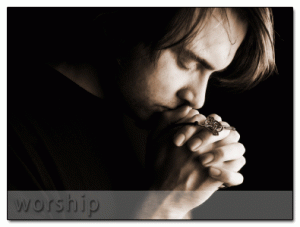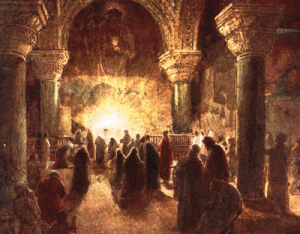
Then Mary took a twelve-ounce jar of expensive perfume made from essence of nard, and she anointed Jesus’ feet with it, wiping his feet with her hair. The house was filled with the fragrance.
John 12:3
Christian devotion is the spontaneous act of extravagant love which ignores all social conventions and practical logic in order to pour out on Jesus all adoration, praise, and honor.
In our attitude . . .
Extravagant love is unreserved: no cultural norms or personal inhibitions will stop us from adoring our Lord.
Extravagant love is unashamed: no fear of embarrassment will prevent us from displaying our love for Christ.
Extravagant love is unexpected: we love Christ passionately because he loved us graciously.
Extravagant love is unrehearsed: our gratitude to him flows spontaneously out of thankful hearts.
Extravagant love is unreal: our love is a supernatural work of the Holy Spirit.
In our actions . . . extravagant love is a passionate burning heart on fire for Christ.
Passionate love is expressive: our love for Christ involves our whole being.
Passionate love is excessive: we are over-the-top in our adoration of Christ.
Passionate love is external: no hiding our devotion to the one who died and rose again.
Passionate love is extensive: our love for Christ involves every area of our lives.
Passionate love is extraordinary: the world cannot understand our convictions, loyalty, and love for Christ.
Maintaining a passionate, extravagant love for Christ fulfills the command to love the Lord, your God, with all our heart, soul, mind, and strength (Matt. 22:37).
“And the house was filled with the odor of the ointment” (John 12:3).By the breaking of that flask and the anointing of the Lord Jesus, the house was pervaded with the sweetest fragrance. Everyone could smell it and none could be unaware of it. What is the significance of this?
Whenever you meet someone who has really suffered — someone who has gone through experiences with the Lord that have brought limitation, and who, instead of trying to break free in order to be ‘used’, has been willing to be imprisoned by Him and has thus learned to find satisfaction in the Lord and nowhere else — then immediately you become aware of something.
Immediately your spiritual senses detect a sweet savour of Christ. Something has been crushed, something has been broken in that life, and so you smell the odor. The odor that filled the house that day in Bethany still fills the Church today; Mary’s fragrance never passes. It needed but one stroke to break the flask for the Lord, but that breaking and the fragrance of that anointing abides.
We are speaking here of what we are; not of what we do or what we preach. Perhaps you may have been asking the Lord for a long time that He will be pleased to use you in such a way as to impart impressions of Himself to others. That prayer is not exactly for the gift of preaching or teaching.
It is rather that you might be able, in your touch with others, to impart God, the presence of God, the sense of God. Dear friends, you cannot produce such impressions of God upon others without the breaking of everything, even your most precious possessions, at the feet of the Lord Jesus.
Watchman Nee, The Normal Christian Life (Fort Washington , PA: CLC, 1985), 281.






